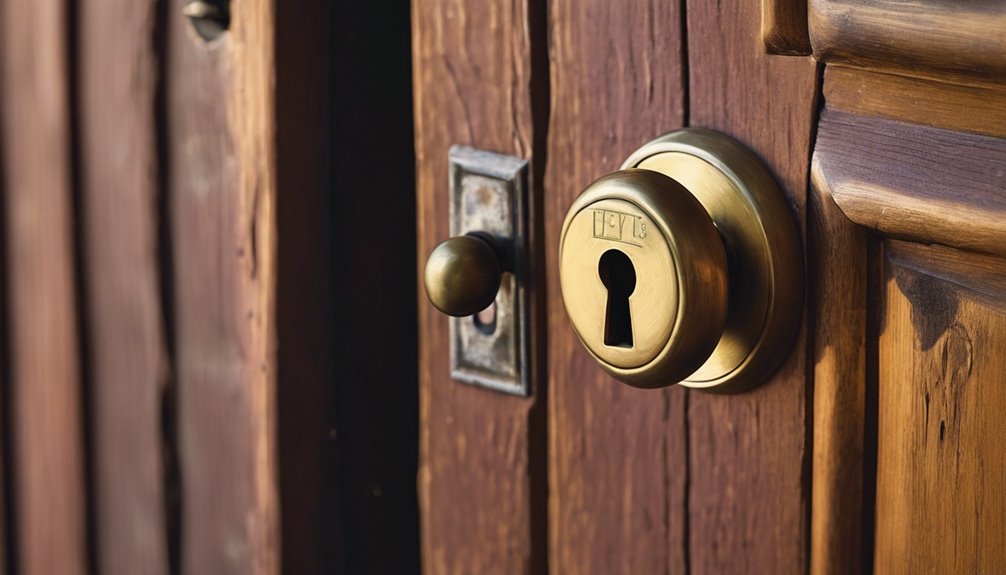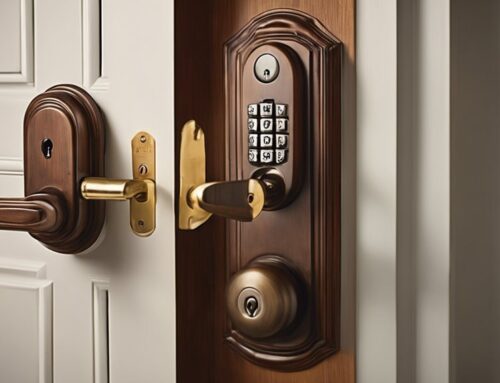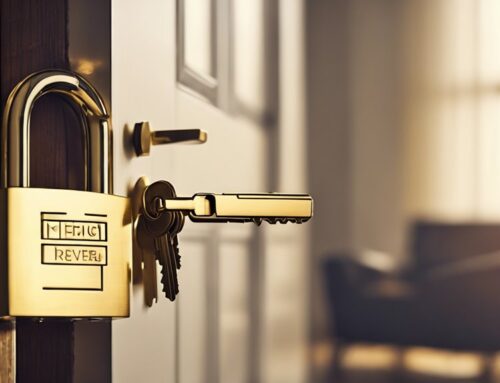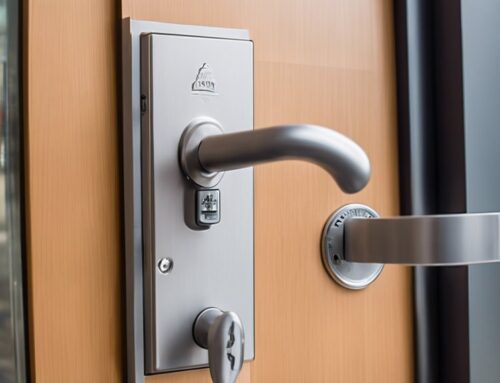Changing locks can be a simple task, yet it holds profound implications for your safety as a tenant in New Jersey. Understanding your rights and the legal processes involved is essential, especially if you find yourself in a difficult situation. You might wonder about the specific steps to take if you need to secure your home urgently. By familiarizing yourself with the laws surrounding lock changes, you can better navigate this sensitive issue and protect your well-being effectively.
Key Takeaways
- New Jersey allows tenants with restraining orders to change locks without a court order for safety reasons, empowering them during domestic violence situations.
- Tenants must provide written notice to landlords about lock changes, including a copy of the restraining order, and share new keys promptly.
- Landlords are required to respond to lock change requests within 48 hours and must comply with local safety codes.
- If landlords fail to act within the specified timeframe, tenants may change locks themselves and are responsible for costs initially, with reimbursement options available.
- Documentation of all communications with landlords is crucial for legal protection and reimbursement procedures related to lock changes.
Eligibility for Lock Changes

When can you change the locks on your rental unit in New Jersey? If you hold a temporary or permanent restraining order issued under the "Prevention of Domestic Violence Act of 1991," you're eligible to change the locks. This eligibility guarantees that you can protect yourself if you're a resident of the rental unit and your situation warrants such a measure.
It's essential to recognize that this right extends to co-tenants who are also victims of domestic violence, allowing you to secure your living space even if the perpetrator has access. In New Jersey, tenants should understand that landlords are required to follow specific procedures when rekeying locks in rental properties, ensuring compliance with state laws. Additionally, locksmiths can play a crucial role in eviction procedures, assisting in the legal and efficient change of locks.
In situations where both the perpetrator and the victim are co-tenants, changing the locks is critical for your safety. This law empowers you to prevent the perpetrator from entering your residence, mitigating potential harm. Additionally, when landlords receive notification of a restraining order, they are mandated to comply within 48 hours, ensuring a swift response to your safety concerns.
Understanding the legal framework is significant: court orders can explicitly require landlords to change the locks on your behalf, further solidifying your right to a safe living environment.
Ultimately, the law not only provides you with the ability to change the locks but also addresses financial responsibilities. While you're initially responsible for the costs, you can seek reimbursement from the perpetrator.
Furthermore, the law protects you from liability issues after you've changed the locks, particularly if done within the stipulated time frame. Being aware of these provisions empowers you to assert your rights and protect your safety in your living space.
Notification and Request Process

Once you have determined your eligibility to change the locks, it's important to understand the notification and request process involved. First, you'll need to notify your landlord in writing that a court has issued a temporary or permanent restraining order mandating the lock change. Be sure to include a copy of the restraining order for documentation. Prompt notification is essential; delay can hinder the overall process.
Your landlord is required to change the locks within 48 hours of receiving your written request. If they fail to do so within this timeframe, you're authorized to change the locks yourself. This 48-hour period is critical, as it directly impacts your safety and complies with the law. This requirement is part of the new legal obligations introduced under the amendment to ensure the swift protection of victims. Notably, New Jersey law also regulates key duplication to prevent unauthorized access, which is an important consideration when changing locks. Becoming a licensed locksmith in New Jersey involves specific steps, ensuring compliance with state regulations that also apply to residential lock changes.
Keep in mind that even if the landlord doesn't act within this timeframe, they still hold responsibilities; their failure to comply enables you to take action.
After changing the locks, notify the landlord again within 48 hours. This time, you must provide a copy of the new keys. Although you're responsible for the costs of changing the locks, you can seek reimbursement at a later date.
Ensuring the landlord receives new keys is essential for compliance and helps prevent potential disputes.
Landlord Responsibilities

As a landlord, you have specific responsibilities regarding lock changes that are essential for tenant safety. You must complete lock changes within 48 hours of receiving a written request, notify tenants about any changes made, and address cost responsibilities should the court mandate reimbursement. Additionally, landlords must ensure that all locks meet New Jersey's lock safety standards to provide a secure environment for both residential and commercial properties. In New Jersey, high-security locks are governed by specific standards and regulations to enhance security systems for both businesses and homeowners. Understanding these obligations helps guarantee compliance with New Jersey's laws and promotes a secure living environment for your tenants. Additionally, it's crucial to abide by local property maintenance codes to ensure the overall safety and well-being of your tenants.
Timely Lock Changes Required
Given the vital nature of ensuring safety for tenants experiencing domestic violence, landlords must act promptly upon receiving a written request for a lock change. Upon receipt of such a request, you have 48 hours to install new locks. This swift response is designed to enhance the security of tenants who may be at risk. If you fail to change the locks within this timeframe, the tenant is authorized to take matters into their own hands and change the locks themselves. It's significant to mention that during these 48 hours, you won't be held liable for any damages or injuries that occur before the tenant has the new key. With locksmith services available 24/7 across New Jersey, tenants can ensure a quick and professional lock change if necessary. Understanding Lock Picking Laws ensures that locksmiths in New Jersey are aware of permissible practices and the legal use of tools. The law mandates these actions to prevent further danger and promote the well-being of victims. Understanding your responsibilities under this framework is essential, as failure to comply could result in legal complexities or disputes. Ultimately, these provisions aim to safeguard the freedom and safety of tenants, ensuring they can secure their homes from potential threats quickly. As a result, timeliness in lock changes isn't just a legal obligation, but a vital responsibility you hold as a landlord.
Notification of Changes Mandated
When tenants submit a written request for a lock change due to a restraining order, landlords must promptly acknowledge their responsibilities. You need to act within 48 hours of receiving this written request, which must include proof of the restraining order. If you fail to change the locks in this time frame, the tenant has the right to do so themselves, and you'll still need to be informed of any changes made. Once the locks are changed by the tenant, they're required to provide you with a copy of the new keys within 48 hours. It's important to keep the lines of communication open; the tenant must notify you about the lock change promptly. Remember, you have the right to obtain access to the property, but you must respect the tenant's security concerns as well. Compliance with court orders regarding lock changes is vital for maintaining a respectful and legal landlord-tenant relationship. Following these guidelines guarantees that you not only fulfill your legal obligations but also contribute to the safety and peace of mind of your tenants during challenging times. Additionally, landlords should be aware of essential employment laws that may impact any locksmith services they engage. Consider hiring a certified locksmith to ensure the lock change is done professionally and securely.
Cost Responsibilities Clarified
Understanding the financial responsibilities surrounding lock changes is essential for both landlords and tenants. In New Jersey, the tenant typically bears the cost of changing locks. This includes the installation of new locks, which the tenant must initially fund.
While tenants can seek reimbursement through the courts, this reimbursement is contingent upon the perpetrator being ordered to pay. Hence, the tenant holds the financial burden for lock changes until a court ruling.
Landlords, on the other hand, aren't required to cover these expenses upfront. If informed by the tenant, they must guarantee the lock change occurs, but again, the financial responsibility falls to the tenant.
Landlords aren't obligated to reimburse tenants unless explicitly ordered by a court following legal proceedings. Additionally, landlords should oversee the proper execution of any lock change.
In addition to financial considerations, businesses should ensure that any locks installed meet ADA compliance standards to accommodate individuals with disabilities.
Ultimately, both parties must adhere to established procedures and understand their respective financial obligations. This framework not only promotes safety but also clarifies the financial responsibilities related to lock changes, particularly in the context of protecting victims of domestic violence under New Jersey law.
Tenant Responsibilities

As a tenant, you're required to follow specific procedures if you wish to change the locks on your rental unit, particularly in situations involving safety concerns, such as a domestic violence incident.
First and foremost, you must notify your landlord in writing about your intention to change the locks. This notification should clearly state that you've obtained a temporary or permanent restraining order.
After changing the locks, you must provide a copy of the new keys to your landlord within 48 hours. This keeps your landlord informed about any security alterations made on the property.
If your landlord hasn't acted on your request to change the locks within 48 hours, you're authorized to do it yourself without waiting longer. However, it's essential that your actions conform to the domestic violence protection laws while making certain the new locks comply with your rental agreement.
You're also responsible for any costs associated with changing the locks and should keep in mind that you may seek reimbursement through the court as part of your domestic violence proceedings.
Additionally, you need to maintain the new locks in good condition, as the landlord won't be liable for any damages stemming from your lock change.
Adhering to these responsibilities not only secures your safety but also protects your rights as a tenant. By being proactive and communicative, you can effectively guarantee a safe living environment.
Court Involvement

When a court issues a restraining order, it can also mandate that a landlord change the locks of the victim's dwelling unit to enhance safety.
It's vital for you to notify your landlord in writing about the court order, as this triggers their obligation to comply within a specified timeframe.
Additionally, understanding the procedures for seeking reimbursement for lock change costs is essential for protecting your rights and financial interests.
Court Order Requirements
Court orders play an essential role in guaranteeing the safety of victims of domestic violence in New Jersey, as they can explicitly require landlords to change the locks on a dwelling unit. When a court issues a temporary or permanent restraining order, it may include directives for the landlord to enhance the victim's safety by changing the locks.
To initiate this process, you must notify your landlord in writing about the court order. Once you've provided this written notification, the landlord is required to install new locks within 48 hours. If the landlord fails to comply within this timeframe, you're empowered to change the locks yourself, providing the landlord with a copy of the new keys within the same duration.
This legal framework guarantees that immediate safety needs are met, preventing further harm from a perpetrator. The laws outlined in P.L.1991, c.261 emphasize the importance of compliance, safeguarding your living environment.
Non-compliance can result in legal consequences for the landlord, reinforcing the necessity for prompt action to protect victims of domestic violence.
Reimbursement Procedures
Maneuvering the reimbursement procedures for lock changes in New Jersey requires a clear understanding of your rights and responsibilities. When you face domestic violence, and a court grants you a temporary or permanent restraining order, you may be eligible for reimbursement of lock change costs.
Importantly, reimbursement needs a court order and can only be sought from the perpetrator, not your landlord.
Here's what you need to keep in mind:
- Notify your landlord about the lock change order.
- If the landlord doesn't comply within 48 hours, you can change the locks.
- Make sure you provide new keys to your landlord within 48 hours post-change.
- File your reimbursement application through the court that issued your restraining order.
- Be aware that while awaiting reimbursement, you're initially responsible for the lock change costs.
Take note that landlords hold no liability for damages or injuries after the lock change, provided they're informed and receive new keys promptly.
Understanding these regulations helps you protect your freedom while maneuvering these sensitive situations. Always consult legal expertise when needed for clarity.
Additional Protections

While maneuvering through the complexities of domestic violence situations, it's crucial to understand the additional protections available to victims regarding lock changes in New Jersey. Under the Prevention of Domestic Violence Act of 1991, you can obtain a court order that mandates your landlord change the locks on your dwelling unit.
To initiate this process, you must notify your landlord in writing about the court order, following the guidelines in sections 12 or 13 of P.L.1991, c.261. The landlord is required to change the locks within 48 hours of receiving your request. If they fail to do so, you have the right to change the locks yourself.
It's important to note that after changing the locks, you're responsible for informing your landlord and providing a copy of the new keys within 48 hours. Though you'll incur the costs of changing the locks, you can seek reimbursement from the perpetrator through the court, adding another layer of financial protection.
Furthermore, if the locks are changed, the landlord still has responsibilities under the lease for maintenance and safety; they won't be liable for damages occurring after the 48-hour notification period.
These legal safeguards aim to create secure living conditions for domestic violence victims, ensuring you have a safe environment to recover and regain control of your life. Understanding these protections can empower you during a challenging time, giving you the freedom to protect your living space.
Local Ordinances and Support

In addition to state protections, local ordinances like those in Newark offer specific support for tenants facing domestic violence.
These ordinances allow landlords to change locks without needing a court order when a tenant has an Order of Protection. This can be an important resource for you if you're working to secure your safety.
Here's what you should know:
- You must request the lock change based on your Order of Protection.
- The landlord is responsible for changing the locks on your behalf.
- Your notification to the landlord must be in writing and include the relevant order details.
- It's vital to inform your landlord within 48 hours after locks have been changed, along with providing copies of new keys.
- Any failure by the landlord to change the locks within this timeframe allows you to take action yourself.
Frequently Asked Questions
Can Temporary Restraining Orders Also Request Lock Changes?
Yes, temporary restraining orders (TROs) can request lock changes.
According to the National Coalition Against Domestic Violence, one in four women experiences severe intimate partner physical violence. This statistic underscores the importance of safety measures like lock changes.
If a TRO includes this request, you must notify your landlord in writing. The landlord must then change the locks within 48 hours, ensuring your protection and peace of mind in a difficult situation.
Who Pays for the Lock Change Process?
When it comes to the lock change process, you'll initially bear the financial burden as a victim of domestic violence.
However, you can seek reimbursement from the perpetrator through the court system.
If a landlord changes the locks, they typically aren't responsible for costs, but they must act promptly on your requests.
What if the Landlord Changes Locks Without Consent?
If your landlord changes the locks without your consent, it constitutes unlawful entry.
You have the right to refuse unauthorized access, and your landlord could face legal consequences.
Document the incident and notify the landlord in writing, insisting they rectify the situation.
If necessary, seek legal advice to explore your options for reclaiming access to your unit and holding the landlord accountable for their actions.
How Can Tenants Prove the Need for Lock Changes?
Nearly 1 in 4 women experience severe violence from an intimate partner, underscoring the essential need for lock changes.
To prove this need, you should provide your landlord with a copy of any restraining order issued against the perpetrator.
Written notification detailing the situation enhances your case, establishing a clear link between your safety and the request for lock changes.
Always document your communication for potential legal support and future reference.
Can Minors Request Lock Changes Under These Laws?
Minors can't independently request lock changes under these laws.
While they're protected from domestic violence, involving a parent or guardian is likely necessary for seeking a restraining order or initiating the request.
The focus of the laws is on victims of domestic violence generally, without specific provisions for minors.
Consequently, you should consider parental involvement to navigate the legal requirements effectively.
Courts may address minor situations, but generally, age isn't specified in protections.
Conclusion
In New Jersey, knowing your rights regarding lock changes can greatly enhance your safety and peace of mind, especially in vulnerable situations. As the saying goes, "A stitch in time saves nine." By understanding the proper notification and request processes, and ensuring compliance with landlord responsibilities, you can proactively protect yourself. Stay informed about your options, and don't hesitate to seek legal support if needed, as securing your home is both your right and responsibility.









